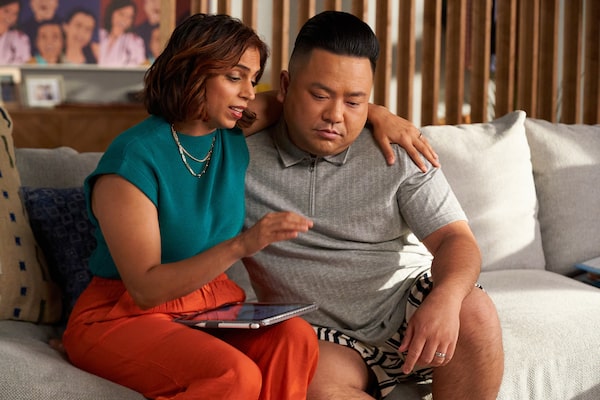
Andrew (Andrew Phung) and Camille (Rakhee Morzaria) comfort each other in a scene from the CBC Canadian sitcom “Run The Burbs”. THE CANADIAN PRESS/HO-Ian Watson *MANDATORY CREDIT*Ian Watson/CBC via The Canadian Press
TORONTO - Newly minted Run the Burbs showrunner Anthony Q. Farrell firmly believes that authenticity is a central part of diverse storytelling – from the script to diverging perspectives on set that express what is real versus “what doesn’t feel true.”
“You see it all the time, I mean just growing up watching shows with Black characters would feel wrong and off,” says Farrell, who was also showrunner on the CBC sci-fi comedy Overlord and the Underwoods.
“Then you find out all the writers are white guys from Harvard, and you’re like, ‘Well, that’s the problem.’ ”
The architecture of inclusive and relatable television is rooted in the writers’ room, Farrell says. It’s what informed the first season of Run the Burbs and continues in the second, which airs Wednesday nights on CBC and streams on CBC Gem.
“Canadian TV needs shows like this, and it’s possible to do it in a way that’s marketable, funny and that is interesting,” Farrell says. “It should engage not just one, but all audience members – we have a family in Run the Burbs that’s unlike any other family on Canadian TV, and with that comes a responsibility.”
The comedy centres on the Phams, a young Vietnamese-South Asian Canadian family, led by a stay-at-home dad played by Andrew Phung, and his entrepreneurial wife Camille, played by Rakhee Morzaria, who upend ideas about contemporary family values and life in the suburbs.
The 45-year-old Farrell, who wrote for the multiple Emmy-winning American comedy The Office and earned the 2022 Showrunner Award from the Writers Guild of Canada, was brought on by producer Pier 21 Films, replacing Shebli Zarghami.
Once on the ground, Farrell came to understand the potential of a series that emphasizes diversity without boxing in BIPOC characters into specific moulds – just a multicultural family existing as any other family would.
‘“I’m all about authenticity and if someone can’t look me in the eye and say that they’ve lived with these characters like this team has, then we’re going to be writing something we don’t know,” Farrell says.
To that effect, Season 2 storylines revolve around Camille’s faded connection to her Indian heritage as she navigates her career, while Andrew has political aspirations as he seeks to make his very suburban community a better place to live in.
Phung, who is also a co-creator on the show, said that while he hasn’t been in the writers’ room on as many productions as Farrell, he knew what kind of environment he wanted to build.
“While Anthony has been in all the rooms, I have the privilege of being in this one room, where we don’t argue about these ideas, it was discussions about traditions and arcs,” says Phung, referring to his time on Run the Burbs.
“I’m coming off of Kim’s Convenience, where I took all of the fallout from that and learned to internalize it here.”
Phung is referring to certain experiences on CBC comedy Kim’s Convenience, which abruptly ended in 2021. Later that year, star Simu Liu publicly complained about a lack of representation among its writers.
Phung adds that cast members brought their own cultural and personal experiences to Run the Burbs, and says everyone was allowed to have a voice.
“I love that in our room that we’re always having these cultural discussions, these honest discussions, and these queer discussions about whether or not we’re doing it right,” Phung says. “When we have these discussions, you walk away not angry – you walk away feeling enlightened and inspired.”
But Phung acknowledges that the core salability of their ideas was aided greatly by the inclusion of Farrell as the steerer of their ship.
He recalls several instances of Farrell encouraging him to stick to his original ideas – such as focusing a story on the Lunar New Year versus a more traditional Christmas episode – when his previous instinct would be to alter them in ways that would please the network over his original intents.
“He’d ask if I like an idea and if so, why would I change it? Instead, we would just need to make it clear to the network and express how passionate we were about it,” Phung says. “He’d explain it to the network and that’s why I totally love this guy. He streamlined the whole process.”
Overall, Phung believes that Season 2 is about a family that lives next door to its audiences. He views it as “that equalizer,” to which a wide variety of viewers can all relate.
Throughout the process, the sentiment of friendship extended to the actors as well.
Candy Palmater, an Indigenous comedian, actor and broadcast personality who played a neighbour of the Phams on the show, died on Dec. 25, 2021.
“Anthony wrote a very lovely episode as a tribute to Candy and her legacy in our neighbourhood and the world,” says Phung when speaking of the yet-to-air storyline.
“It’s a show that swings like that – we’re a show that’s a comedy, but we’re willing to go places that recognize our neighbours and all of our friends we met along the way.”
This report by The Canadian Press was first published Jan. 4, 2023.
This content appears as provided to The Globe by the originating wire service. It has not been edited by Globe staff.